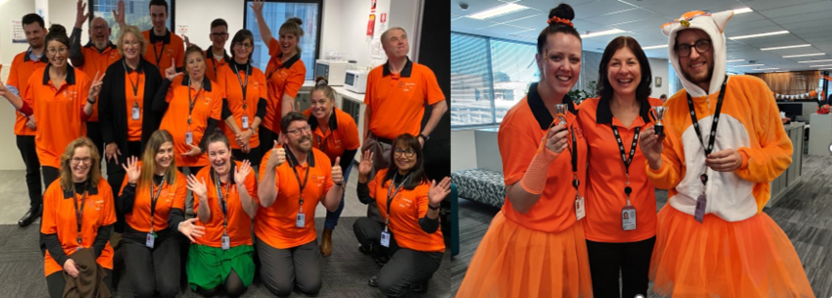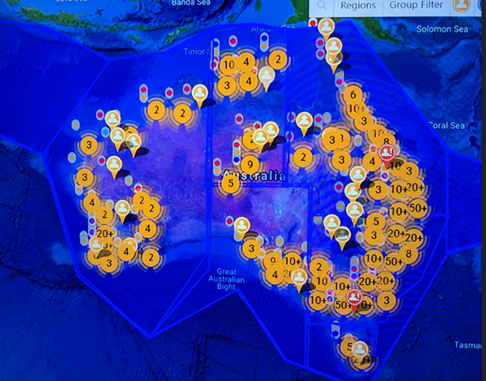Story 12: Health, safety and wellbeing of staff
Introduction
Looking after the health, safety and wellbeing of the 35,000 Census staff across Australia was a high priority for the ABS. The nature of office and field roles are quite different, requiring unique approaches for each group.
Our office staff
Preparing for and running a Census comes with considerable effort and can result in pressure on our staff to consistently meet numerous deadlines over a long period of time. Census staff were given all the employee support and safety mechanisms that ABS office staff are given. However, we identified the need to expand on this support to address staff wellbeing in the Census more explicitly.
Underpinning this was the development of a Census Wellbeing Framework and Wellbeing Strategy.
Meld Studios built the framework using research into best practice models, such as those used by Beyond Blue, the Blackdog Institute, the Australian Electoral Commission and Safe Work Australia. The model was adapted for the special aspects of the ABS and Census culture.
The Framework vision was: ‘The 2021 Census is committed to supporting staff, promoting staff wellbeing, safety and positive relationships to enable staff to reach their full potential’. It identified six areas of wellbeing to consider: mental health, work, relationships, environment, physical health and workplace culture. The Wellbeing Strategy outlined specific and measurable actions to be taken to address each of the Framework elements.

Staff were encouraged to be creative with and celebrate the orange Census theme
A key action of the Strategy was to set up a Wellbeing and Engagement Project Team. The team was established in March 2020, with staff from across the Census self-nominating to join the team in addition to their regular role.
Some examples of the activities coordinated by the team include:
- monthly social activities, many run online – such as 10,000 steps, program breakfasts, a bird spotting competition and milestone celebrations
- a survey of Census staff to identify risk factors and generate ideas for actions that the leadership and wellbeing teams could take to further support staff
- guidelines for conducting meetings to improve their effectiveness and minimise their impact on staff time with particular consideration to people working from home or in a different office.
‘Put our staff first’ was ingrained throughout the Census program, including in the issues and crisis management activities, where the safety of our staff was paramount.
When COVID-19 restrictions required staff to work from home, the ABS was well placed, having enabled staff to do this for several years. We were ready both from a technical and cultural perspective to easily switch to this model. A subsequent staff survey indicated that the majority of staff (93%) were working at home at least some of the time, and 73% of staff were working from home all of the time. We recognised that with an extended work from home period, it was even more important to focus on wellbeing and actively build social connections across the Census Program. Due to security and privacy protections, staff processing the Census responses could not work from home, so active management of a small number of COVID cases in the office was necessary.
The Census team organised induction programs for all staff, including Census 101 training and a whole of Census Program workshop in early 2021, called the Census Survival Guide.
Census Survival Guide sessions were recorded and teams were encouraged to participate together. This included watching presentations and then working through team and personal reflection exercises.
Some of the topics for the Census Survival Guide included:
- understanding peaks and troughs of the Census so staff could mentally prepare for when extra effort was going to be required
- listening to reflections from veteran Census staff on what working on the Census is like
- recording their team definition of success
- developing a personal Census wellbeing plan that aligned with the Census Wellbeing Framework.
Field staff
Census field staff were provided with a phone application, called SafeZone, that allowed us to monitor their safety when working outside their homes. They were required to log in when they started and stopped their work and if a staff member failed to check out as expected, alerts would be automatically triggered. Staff could also trigger incidents in the case of an emergency or the ABS could send safety alerts to staff in the field. This was the first Census where field staff had automated and centrally monitored check-in and check-out services.

Real-time map of Census staff in the field generated by SafeZone
The ABS put in place a dedicated Census Workplace Health and Safety Team and Safety Advisor Line that provided timely and consistent advice and support to all field staff on work health and safety procedures, processes and training. The team:
- managed 22,000 active SafeZone users, with 284,843 check-ins
- responded to 14,000 alerts, with 700 escalated to the field staff support centre and 12 escalated for emergency contact or police action.
The ABS supports a reporting culture of incident and hazard management. Field staff were able to lodge these in real time and when appropriate, link them to addresses, so that any action could be taken immediately.
The ABS classed an incident as an unplanned event that caused, or had the potential to cause, injury, illness, exposure, damage or loss. This included near-misses. For example:
- getting an electric shock
- falling over and spraining an ankle
- being bitten or chased by a dog
- being threatened by another person
- being involved in a car accident
- experiencing dangerous levels of fatigue while driving.
We classed a hazard as a situation or thing with the potential to harm a person. For example:
- a road in poor condition
- an unlit stairway
- an upset or agitated person
- fatigue
- extreme weather
- an unrestrained dog.
For the duration of field activities there were more than 1,331 incidents reported and 2,188 hazards where action was required. In addition, more than 44,000 beware hazards were recorded for the attention of field staff.
| Hazards category | Hazards total (no.) | Incidents category | Incidents total (no.) |
|---|---|---|---|
| Vehicle hazard | 634 | Occupational violence | 355 |
| Dangerous animal | 510 | COVID-19 | 311 |
| Occupational violence | 413 | Vehicle incident | 202 |
| Slip, trip and fall hazard | 346 | Dangerous animals (including 2 goats) | 171 |
| Structural hazard | 121 | Slips, trips and falls | 128 |
| COVID-19 | 91 | Physical injury | 77 |
| Poor reception | 14 | Damage to property | 36 |
| Resident mental/physical health | 14 | Mental stress | 35 |
| Chemical exposure | 11 | Other | 7 |
| Substance exposure | 8 | Failed check-out escalation | 4 |
| Other work health and safety risk | 8 | Working alone/lone working | 3 |
| Injury risk | 8 | Community unrest | 2 |
| Lone working | 6 | Total | 1,331 |
| Weather hazard | 4 | ||
| Total | 2,188 | ||
Success measures for health and wellbeing
Measuring success of a cultural program of this type is not simple or obvious. Anecdotally it has been a big success, with staff surveys showing positive reflections and feedback. The majority of staff reported feeling:
- good or very good about their day
- empowered and supported in their job
- positive about their supervisor and management
- safe.
These results have been consistently strong across diverse groups, locations, job classifications and Census teams.
The ABS was supported by the FBG group throughout Census preparations and operations to help build a resilient workforce. They facilitated Census workshops, provided coaching and support to the Census Leadership team, and helped establish the Census Wellbeing and Engagement Project team. Their support assisted us in establishing a strong culture of open communication and inclusiveness.

"The Census has been one of the most interesting (and significant) projects in my career. Many organisations pay lip service to wellbeing – particularly when the challenges are a bit curly. Census has taken a long-term and inclusive approach to ensuring every effort is made to support its people. A staff driven wellbeing working group did amazing work – and kept the wellbeing discussion “real”. I was delighted to find wellbeing embedded in the strategic planning phase – and personally participated in workshops with multiple groups. The willingness for senior leaders to initiate and participate in these activities was constant and always positive.
One highlight was the week I spent in Canberra over Census week. My brief – “Simon – just make sure we are all ok – you’ll work it out.”
I am grateful for the openness to a bit of creativity – some of our workshop content or titles were not exactly mainstream, but so “Census”. Overall – a privilege to work with such fantastic people and play a small part in a successful Census. Bring on 2026!’
Simon Brown-Greaves, CEO and organisational psychologist, FBG Group
